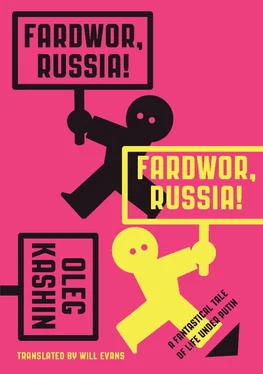The flight to Moscow took an hour and forty minutes. Vasya, as it turned out, had never flown before, and the editor (we call her a girl, but she was really forty-two, named Inna, divorced, with a thirteen-year-old daughter, Olesya) was even worried that Vasya might get sick on takeoff, but the ex-midget fell asleep while the plane was still on the ground, with his head on her shoulder, and she looked at him and for some reason also imagined him with no clothes on. Jumping ahead, just to let you know, that same night in Moscow, in a room at the Altai Hotel, Inna would become the first woman in Vasya’s life, and Vasya would become her first man in the last year and a half. Love is basically amazing, when you get down to it.
INNA, BY THE WAY, didn’t have to worry—she could have been equally successful at dragging any type of person to the show’s taping, because during the whole time he was on the program, Vasya only managed to get out one sentence, “I was unjustly fired;” the host Malakhov told the rest of the story for him. Malakhov had a folder with an article printed off the Internet in it, “Growing Pains.” There were lots of people in the studio along with Vasya: an actor from a popular court drama, the famous cat trainer Yuri Kuklachev; a State Duma representative from the party United Russia (his name and face Vasya couldn’t remember later); and some other people, including the film director Sergei Soloviev; whom Malakhov tried to remind several times that he had midgets in the cast of his movie Assa , but Soloviev kept talking about Anna Karenina instead. If Karpov were a TV watcher, he would probably have been disappointed—if not about the general idiocy of the discussion, then at least because Vasya didn’t call him after his growth spurt. But Karpov didn’t watch television and he still hadn’t fully recovered from his illness—he didn’t go to his shack, but lay on the sofa talking to Marina, who, although she enjoyed listening to Karpov’s childhood stories, could hardly conceal the fact that she didn’t like living there and that she would be all too happy if Karpov agreed that it was time to move back to Moscow.
But the fact that the Karpovs don’t watch television doesn’t mean that nobody watches television. The show wasn’t even over when the phone rang in the office of Let Them Talk ; it was the secretary of the Vremya-Kapital corporation, and she wanted to know if that midget they were showing on TV was still in Moscow. In fact Vasya might have already left, because the filming had taken place the day before, but Inna had changed his ticket and paid for the hotel room for another twenty-four hours—she would have paid for another couple of days, but she didn’t have the funds. What the Vremya-Kapital corporation needed with Vasya the secretary didn’t say, but half an hour later a taxi stopped by the hotel Altai and within ten minutes Inna was left all by herself in the room, while Vasya, escorted by a silent security guy with a shaved head, was on Altufievskoe Highway in the taxi, heading for the Moscow Beltway.
I guess it’s time to tell you about who Vremya-Kapital really are (well, you understand that the name of the corporation has been changed; unlike Vasya, I don’t want to have to go to court). In Russia there are a number of companies whose names are not bandied about, and they get in the news much less frequently than Gazprom or Lukoil, but if you take a closer look, they have their assets in the oil and gas industries, metal-working, telecommunications, construction; and the name of the owner, though not as familiar to the public as, say, “Roman Abramovich,” firmly maintains an honorable position somewhere between fifteenth and twenty-fourth place in the Russian Forbes’ annual list of billionaires.
The founder of Vremya-Kapital, Arkady Magomedovich Magomedov, it must be said, had made it in to Forbes just once—in 2004, and back then the editor hadn’t been able to find a photo of him, and instead of a photo portrait, they had published a shaded silhouette (rumors were that the deceased Paul Klebnikov fined one of the staff for this failure).
Not much was known about Arkady Magomedovich. He was born somewhere between Dagestan and Georgia, spent time in prison for something or other from 1982 to 1986. By the way, when he was in prison, David Tukhmanov wrote a song especially for Magomedov, “In My House,” to make his experience in the big house more pleasant; it was first performed by Sofia Rotaru at a concert on Soviet Police Day in 1983—later Magomedov would give Tukhmanov a cherry-red Mercedes-Benz for this gesture. After he was released, he immediately became a well-known figure in the cooperative business movement; the co-op youth respectfully called him an old tsekhovik , but we have no further details about him. December 6, 1999 is considered the date of the founding of the Vremya-Kapital corporation; Vremya was the name of a chain of video salons in Moscow train stations founded by Arkady Magomedovich in 1988 and which remained in business until 1992. Under this nostalgic brand-name, he consolidated all of his assets and in 2003, when the offices of Vremya were raided, there was even an article in Kommersant with the headline, “They Came for Magomedov.” They came but walked away with nothing, everything went back to normal. Wagging tongues say that Magomedov managed to get a call through to the president’s right-hand man, Igor Sechin, and explained to him that the most influential clans of Chechnya, Ingushetia, and Dagestan, which had business relations with Magomedov, were ready to do everything they could to destabilize the situation in the north Caucasus if Arkady Magomedov’s businesses were to be subjected to so much as a threat from the government. Whether or not Sechin took this seriously is not known. After several days, the vice president of Vremya was kidnapped, held for a week at someone’s country house, apparently in Serebryany Bor (Kukushkin could see a church on the other side of the river), and was fed some pills that were meant to loosen up his tongue. With his loosened tongue, Kukushkin told them that, yes, if Magomedov were to go to jail, there would be war in the Caucasus—but he had nothing more to say, that’s all he knew. After that Kukushkin would be found sleeping in a subway car at the Vykhino metro station, he would then retire from his position as vice-president and move to America on a pension supplied by Magomedov.
After Kukushkin’s kidnapping, Vremya was left alone, and from this point forward Vremya became especially aggressive on the market; it is known that at one point there was an incident, for example, with the director of one of the oil refineries in western Siberia who wasn’t happy with the amount of compensation that Magomedov offered him for a controlling share in the factory. Someone higher up in Moscow even offered the director protection, and he was going to go to talk about Magomedov with that important someone, but he didn’t make it to Moscow—on the way to the airport he told the driver he wanted to go for a swim before his flight (in September, in the Irtysh River!), so he ran to the river, throwing his clothes off along the way, jumped in, and died of a heart attack in the water. What it all meant, no one really knew, but all the other business owners whose companies were of interest to Vremya, when they retell this story to each other have since that time preferred not to contradict Magomedov. And when Magomedov suddenly died in 2005, it seemed like the entire Forbes list and half of the presidential administration flew in to Derbent for his funeral.
The funeral procession was headed up by his eldest son—one of the deceased’s two heirs—Kirill Arkadievich (they interred Magomedov “Russian-style,” on the third day, in a coffin without a mufti; whether or not he was actually a Muslim, nobody knew). Arkady Magomedov had left his fortune to his two sons, but the youngest, Mefody, didn’t come to the funeral, he didn’t appear in public at all during these years, although, along with Kirill, he was the “co-chairman of the board of directors”—a one-of-a-kind job title in world business practices, it turns out. Vremya’s public relations office explained that all the representative functions had been taken over by Kirill Magomedov, and Mefody Arkadievich became the brains of the corporation, and that it was he who did all of Vremya’s strategic planning. A source from Vedomosti remarked that it was this Mefody Magomedov who was responsible for all of Vremya’s major contracts, and without his younger brother Kirill would not have been able to hold together the empire left by their father.
Читать дальше




![Stephan Orth - Behind Putin's Curtain - Friendships and Misadventures Inside Russia [aka Couchsurfing in Russia]](/books/415210/stephan-orth-behind-putin-s-curtain-friendships-a-thumb.webp)






